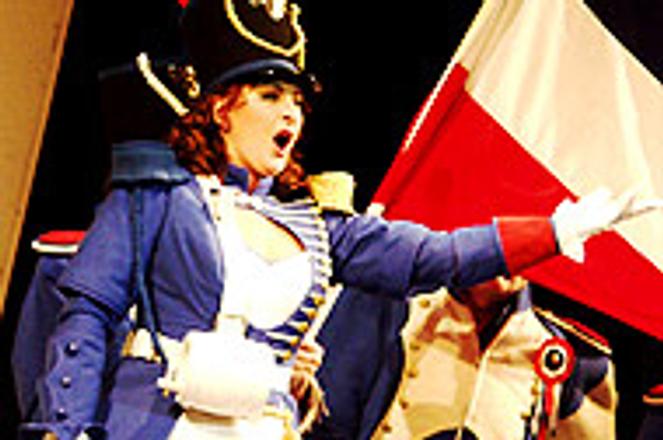THIS comic opera, the director says, is dessert.photo: Courtesy of the Slovak National Theatre
ACCLAIMED Slovak stage director Jozef Bednárik, famous for his extravagant tastes, just recently troubled the calm, classical waters of the Slovak National Theatre with his modern, sporty, and Coca-Cola-sipping Cinderella set to Gioacchino Rossini's music. Now he is bringing the loud colours and culinary specialities of the Tyrol Alps into Gaetano Donizetti's La Fille du Regiment (The Daughter of the Regiment) opera, which will premiere on March 19 and 20.
"The whole performance is a culinary feast of good singing and good mood," said Bednárik, revealing that this comic work is on his personal Top Opera list.
The successful Italian composer Donizetti composed the opera in Paris in 1840, where he went after Italy's political censors banned his new opera Poliuto. In Paris he reworked Poliuto into a grand opera and gained contracts for other works. The first was the two-act La Fille du Regiment, composed in the typical French genre - opéra-comique, which is based on a light-hearted theme with spoken dialogue.
The opera's music is also light but with demanding arias for the main parts. Though met with negative criticism at the beginning, the work became very popular and its character Marie became a favourite role of some of the world's most renowned coloratura soprano singers, such as Henriette Sontag, Joan Sutherland, and Edita Gruberová.
photo: Courtesy of the Slovak National Theatre
The existence of several different versions of the opera caused a problem for the Slovak set designers, who had difficulty deciding where to set the story. According to one version the story takes place in Switzerland, while another says it is in Tyrol. At the end they chose Tyrol because "it is 200 kilometres closer [to Slovakia]".
Thus, set in Tyrol at the end of Napoleonic wars in 1815, the opera is a story of a search for truth and love. Young and beautiful orphan Marie, who grew up in the company of Napoleon's soldiers, is taken into custody by Marquise de Berkenfield to learn the manners of a young lady while her love, Tonio, decides to join the army because of her.
"I'm not bothered by the banality of the libretto. Just as I like the pictures of the Kovačica amateur painters, I accept the poetic alphabet of the opera. It seems to me that the opera's librettists became like the naive painters and drew a picture for Donizetti to colour in. They created something that after so many years stops having a cheap chromo type character and becomes a museum piece," Bednárik said.
According to him, the opera can be staged only if a theatre has enough bravura singers to fill the demanding roles. Adriana Kohútková, Petra Nôtová, and Ľubica Vargicová share the role of Marie, and Oto Klein, Michal Lehotský, and Ľudovít Ludha alternate in performing Tonio.
One of the Maries, Vargicová, said that she feels comfortable performing among the many "young and strong soldiers", as she grew up more among boys than girls. "I feel good in the role but I have to refrain from being too bossy, as it is then reflected in the singing, which should be milder," she said, adding that all three Maries have inserted some coloratura pieces, as certain parts were too low, and the beauty of their singing thus would not be fully expressed.
"The audience was already served a juicy beefsteak, Verdi's Macbeth, it had the artful relish of Bartók's Duke Bluebeard's Castle, and now we offer it the dessert. A dessert that tastes of good singing and interesting atmosphere," said Bednárik.


